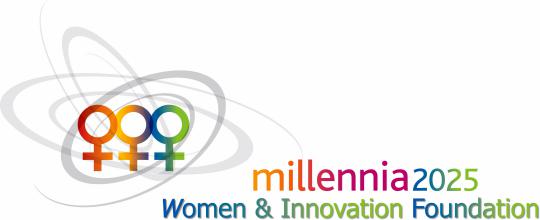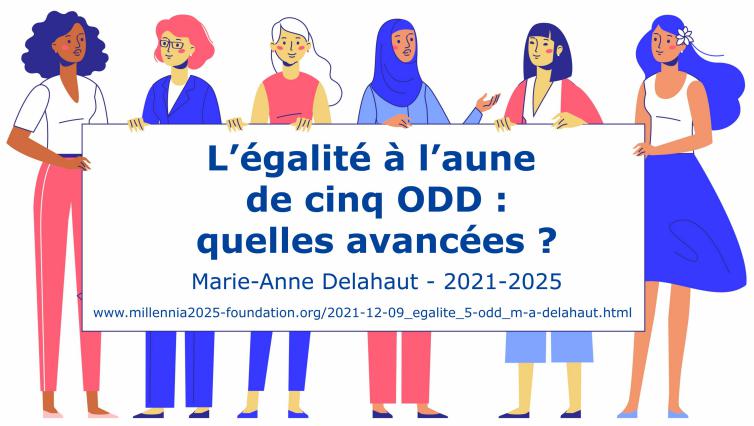_______________________________
International Public Utility Foundation
for women's empowerment and equality
www.millennia2025-foundation.org
> L'égalité à l'aune de cinq ODD : quelles avancées ?
3. Education
2021 < 2025 [pdf, 55 pages]
> Cinq ODD > 1. Cohésion liée au genre > 2. Santé > 3. Education > 4. Egalité
> 5. Justice > 6. Leadership économique > 7. Intelligence et solidarité > 8. Veille-action
L'éducation est essentielle et ne doit pas être un privilège. Dans de nombreuses régions, en raison de l'obscurantisme ou de la pauvreté notamment, les garçons vont à l'école mais pas les filles. C'est dramatique.
L'UNESCO souligne que l'égalité de genre dans l'éducation ne peut être réalisée uniquement par le secteur de l'éducation, que c'est une question de société. Les dommages résultant de l'exclusion des études pour les filles influent sur de nombreux domaines et sur le long terme, des pratiques d'éducation négative pouvant se transmettre par les mamans ainsi rejetées de la société. Le manque d'accès à l'éducation, à l'information et à la formation sont gravement dommageables.
Concernant les études scientifiques, la présence des jeunes filles n'augmente pas suffisamment. Les notions de racisme, de sexisme et de stéréotypes de genre sont des freins qui devraient être levés. Lors de la conférence Millennia2015 "Femmes actrices de développement pour les enjeux mondiaux" les 7 et 8 mars 2008 au Palais des Congrès de Liège, la Commissaire européenne responsable de la société de l'information et des médias Viviane Reding présentait déjà sa structure des "IT Girls, Great Careers for Great Women". Les confinements rendent le télétravail et les réunions en ligne indispensables, l'éducation doit suivre pour toutes les personnes qui doivent utiliser les technologies. L'Intelligence artificielle doit faire avancer l'humain et ne pas porter ombrage aux intelligences collectives associées aux compétences numériques comme moteurs d'autonomisation.
^
> Gender Report - A new generation: 25 years of efforts for gender equality in education, Global Education monitoring Report 2020, United Nations Education, Scientific and Cultural Organisation - UNESCO (26)
"Education is a critical lever for women’s rights. A focus on education, particularly that of girls, can break the cycle of disadvantage between generations, as children tend to acquire more education than their parents. At the same time, the extent to which parental education determines children’s education, while declining slowly, is still high, which calls for interventions to prevent inequality from persisting.
Gender equality in education cannot be achieved by the education sector alone. Residual negative gender norms in society bring gender bias in education, influencing teachers’ attitudes, subject and career choices, and affect women’s opportunities later in life."
"Key findings
v There has been a generational leap in access to education for girls over the past 25 years;
v Girls' learning outcomes are improving faster than boys', but new gender gaps are developing in digital literacy skills and a majority of illiterate adults are still women;
v Despite progress, girls continue to face the worst forms of exclusion;
v Gender interacts with other disadvantages to exacerbate exclusion from education;
v Some subjects are still male-dominated, which affects equality in work and adult learning opportunities;
v Policy interventions can reduce the chance of education disadvantage being passed to the next generation;
v Increasing numbers of laws and policies promotes gender equality in education on paper, but sill often fails in practice;
v Strong political commitment has reduced early pregnancy rates and provided education for pregnant girls and young parents;
v The prevalence of early pregnancy can be linked to lack of access to sexual and reproductive health education;
v Gender-responsive school counselling could improve gender balance in subject choices;
v Countries still produce textbooks with gender-based stereotypes and limited references to women and girls;
v Gender inequality exists in teacher recruitment and promotion to leadership, and more gender-sensitive teacher education is needed;
v Millions of schools are not inclusive, often due to poor infrastructure and unsafe learning environments;
v School-related gender-based violence impedes inclusive education of good quality;
v Change in education will not happen until unequal gender norms in society are stamped out."
"Fed by this overview of progress toward gender equality in and through education over the past 25 years, the analysis highlights that not all have benefited, and many are still left behind, especially when gender intersects with other characteristics, such as poverty, location, ethnicity or disability. Building on the 2020 Global Education Monitoring Report, this edition demonstrates how the principle of inclusion in education can advance gender equality in education and beyond.
Policy-oriented recommendations are aimed at guiding those working on a new text, to be determined at the Generation Equality Forum in 2021, that could replace the Beijing Declaration for the next generation of girls and women."
^
> 2021-02-11 - International Day of Women and Girls in Science, Graduate Women International (27)
"v Female authors have accounted for only one third of all authors on published COVID-19 papers since January 2020. [Nature]
v Only 30% of the world's researchers are women. While a growing number of women are enrolling in university, many opt out at the highest levels required for a research career. [UNESCO]
v Women hold only 20% of technology jobs worldwide. With so many job opportunities, it is vital that women have access to tech career support and tech-education. [ITU]
v Only 26% of computing jobs are held by women with this number in decline. [ITU]
v "To rise to the challenges of the 21st century, we need to harness our full potential. That requires dismantling gender stereotypes. On this International Day of Women and Girls in Science, let’s pledge to end the gender imbalance in science." - UN Secretary-General António Guterres."
^
> Care & Climate, Understanding the policy intersections, A feminist Green New Deal Coalition Brief (28)
"Care is at the core of a feminist, regenerative economy that honors human rights, meets the needs of all people, and enables us to live in right relationship with the Earth.
The work of caring for others has long been a site of struggle for racial, economic and gender justice movements, with advocates asserting powerful critiques around the ways that white supremacy, patriarchy and capitalism meet to commodify, profit from, undervalue and devalue, and invisibilize and marginalize the life-sustaining and life-giving work of caring for the land and caring for each other. The legacy of these many transhistorical struggles also include radical visions of what a world that honors, recognizes, and prioritizes care for all could — and must — look like.
In order to build a feminist, regenerative economy, care in all its forms - whether paid or unpaid, formal or informal - must be valued and respected.
Alongside this issue brief — that focuses on ensuring dignified, wellpaid and safe employment in the waged care sector — we push forward in our broader advocacy that centers and values care in all its forms. The intersecting crises of climate, care, and inequality demand nothing less."
^
> Millennia2025 digintelles 2.0 : Intelligences collectives et compétences numériques comme moteurs d'autonomisation", un outil de prospective stratégique tant face à la pandémie que dans le contexte dramatique de la guerre en Ukraine (29)
La pandémie et les guerres changent nos vies, menacent notre avenir et celui des prochaines générations, fragilisent les relations humaines. Les intelligences collectives associées aux compétences numériques sont devenues indispensables pour communiquer et nous réorganiser aux plans personnel, familial, social ou professionnel. La communication en ligne est désormais essentielle, même au niveau local, toutes générations confondues.
Les inégalités n'en sont que plus vives, particulièrement pour les jeunes générations. Trop de femmes et de filles partout dans le monde en sont dramatiquement victimes. Les violences infligées aux femmes augmentent terriblement lors des confinements et des guerres.
La Fondation Millennia2025 Femmes et Innovation vous invite, de toutes les régions, individuellement ou avec vos associations et communautés, à contribuer à digintelles 2.0 : quelques minutes suffisent pour répondre aux 7+1 questions en ligne.
Votre témoignage contribuera au rapport que Millennia2025 diffusera aux décideurs pour renforcer les libertés, la santé, l'éducation, l'égalité et le leadership économique des femmes, en mise en œuvre des Objectifs de Développement durable des Nations Unies (ODD).
digintelles 2.0 a reçu le label ONU Femmes France et Génération Egalité en 2020 et en 2021, et diffuse cette courte vidéo (29) : nous espérons votre participation !
^
> Youth4Climate: Driving Ambition, Manifesto, Italy 2021 (84)
"Almost 400 young people aged between 15 and 29 from 186 countries met in Milan from 28 to 30 September 2021 to address the main urgencies and priorities of climate action.
The ‘Youth4Climate: Driving Ambition’ meeting in Milan was part of the process of involvement of young people, which started in 2019, also thanks to the support of Italy, with the United Nations Youth Climate Summit, held in New York on 21 September 2019.
Key message about Education:
"EDUCATION – Call on governments to ensure comprehensive and universal climate change education and climate literacy for all and adequate funding for it according to international timelines. The main objective is to empower people of all ages with the knowledge, skills, values and attitudes to address climate change. Education should have a holistic approach, integrating indigenous and local knowledge, gender perspective, and promote changes in lifestyles, attitudes, and behaviour, ensuring climate-neutrality and climate-resilience of educational institutions. Key actions include: Integrating climate change learning into the curricula at all levels by introducing climate change elements into existing subjects, training policymakers, teachers, children, youth, the private sector, and communities, integrating climate change into education policies and education into climate change policies including NDCs and national adaptation plans, ensuring the review of climate education policies and coordination between ministers of education and environment, promoting formal, nonformal, and informal education, peer to peer learning, and extracurricular activities. Youth should have access to funding for youth-led projects and more access to paid internships, exchanges and capacity building activities."
^
> Reboosting representation, Using corporate social responsibility (CSR) and philanthropy to close the gender gap in tech, McKinsey & Company, 2020 (85)
Conclusion - check their six detailed best practices:
" […] Changing the trajectory of women’s representation in tech is not easy, but tech companies are experts at using rapid prototyping and innovative solutions to solve incredibly complex issues. It may require some disruption of the current way of operating, but, after all, disruption is tech’s specialty.
If tech companies rise to this challenge, we could see a dramatic increase in the number of women studying computing in the next five years. These companies have the potential to reshape the whole ecosystem, until girls are studying computing in equal numbers as boys, from kindergarten through graduate school. Women will then enter tech companies at the same rate as men, and once there, they will thrive, advance, and lead."
^
_______________________________
(26) Gender Report - A new generation: 25 years of efforts for gender equality in education, Global Education monitoring Report 2020, United Nations Education, Scientific and Cultural Organisation - UNESCO, 92 pages.
https://www.gcedclearinghouse.org/sites/default/files/resources/200666eng.pdf
(27) Graduate Women International (GWI), "2021-02-11 - International Day of Women and Girls in Science", 2021, 2 pages. https://graduatewomen.org/wp-content/uploads/2021/02/Intl-day-of-women-and-girls-in-science-2021-Infographic.pdf
(28) Lenore Palladino and Rhiana Gunn-Wright, Care & Climate, Understanding the policy intersections, A feminist Green New Deal Coalition Brief, 04.2021, 26 pages.
http://feministgreennewdeal.com/wp-content/uploads/2021/04/FemGND-IssueBrief-Draft7-Apr15.pdf
(29) Millennia2025 digintelles 2.0 : Intelligences collectives et compétences numériques comme moteurs d'autonomisation", l'outil de prospective renforcé de Millennia2025 pendant la pandémie ;
http://www.millennia2025-foundation.org/digintelles.html
Courte vidéo de présentation : http://www.millennia2025-foundation.org/presentation-de-digintelles-2-0.html
(84) Youth4Climate: Driving Ambition, Manifesto, Italy 2021, https://ukcop26.org/wp-content/uploads/2021/10/Youth4Climate-Manifesto.pdf, 2021, 47 pages.
(85) Reboosting representation, Using corporate social responsibility (CSR) and philanthropy to close the gender gap in tech, McKinsey & Company, 2020, 104 pages.
https://127j5241bcgw285yu54bgh7m-wpengine.netdna-ssl.com/wp-content/uploads/Rebooting-Representation-Report.pdf
> Partagez cette analyse avec vos réseaux :
_____________________________________
Millennia2025 Women and Innovation Foundation
Organization in Special Consultative Status
with the United Nations Economic and Social Council
(ECOSOC) since 2019
________________________________
(c) https://www.Millennia2025-Foundation.org
Powered by hosted by wistee.fr
hosted by wistee.fr

